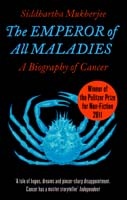The ancient Egyptian physician Imhotep[a] described cancer in about 2500 BC, but when writing the section on therapy he had to limit himself to the words "there is none".

The Emperor of All Maladies
Siddhartha Mukherjee
ISBN: 9780007250929
Fourth Estate / HarperCollins, 2011
English
An incredible "biography" of this most deadly disease. The strength of the book comes in its raw realism - in the avoidance of ungrounded feel-good optimism, but also in the avoidance of a depressing dystopia. (5/5)
This mention, as case study number 45 out of 48[b] in the Edwin Smith Papyrus[c], is the first recorded mention of cancer. The hopelessness that is expressed in the words "Therapy: There is none" was to be the defining characteristic of cancer for the next several thousand years. No cure. Not even palliatives.
Mukherjee expertly charts the history of mankind's battle with cancer. How diffuse medical observations first established that unregulated cell division was the cause of the hitherto mysterious lumps, and the mysterious white blood of leukemia patients. How the scientists sought to combat it - sometimes making brief progress against one type of cancer, under certain circumstances; sometimes having to admit total defeat after expending staggering amounts of effort.
In parallel with the research, we get an insight into the human side of scientific research: The political machinations that distribute the required resources for said research. Public funds, certainly, but also how the medical profession itself slowly swing from preferring one type of treatment over another. It is at times a harrowing tale.
The author is very good at explaining the reasoning behind these trends; and in many cases, where the reasoning went wrong. I think this is the greatest thing about the book. Instead of being treated to a sequence of "first we tried X, it didn't work, then Y, it didn't work, ...", we get an insight into why X was tried. The people doing cancer research are smart, and one understands how they could find themselves being led by their intuition down a blind alley. Very often one is, despite hindsight telling one that this is to be yet another failure, so convinced by the reasoning that one expects to see the sentence "and then cancer was cured" at the end of the chapter.
I'm not spoiling anything by saying that no such sentence is to be found in the book. But it still ends on a positive note. After having learned of the arduous climb toward a cure for cancer that is still happening, one is left feeling humble after being confronted by immensity of the task; yet the amazing progress that has been made points to a cure eventually being found.
The strength of the book comes in this raw realism. In the avoidance of ungrounded feel-good optimism, but also in the avoidance of a depressing dystopia.